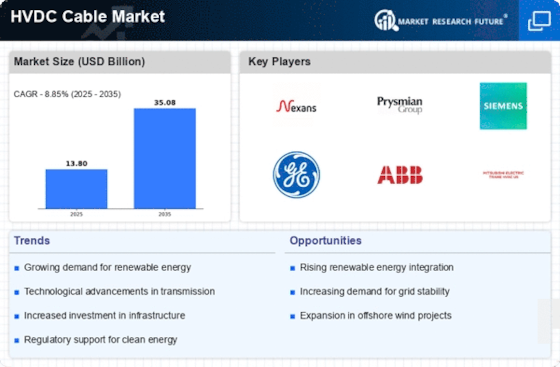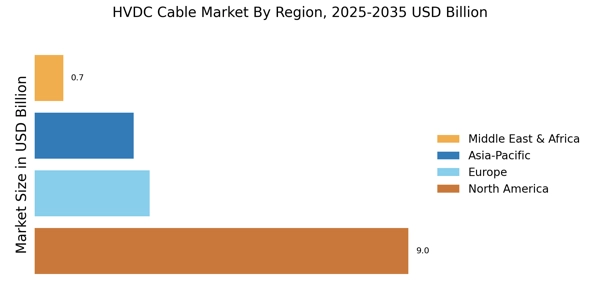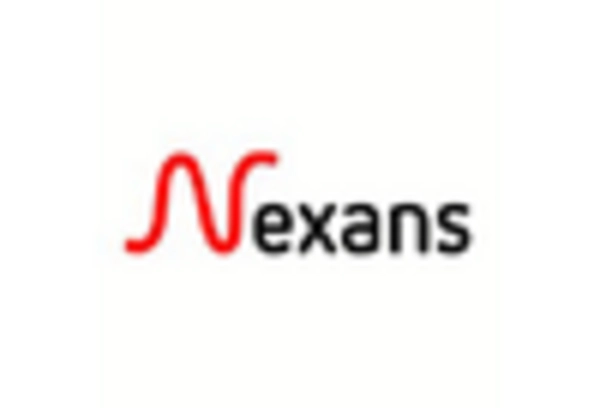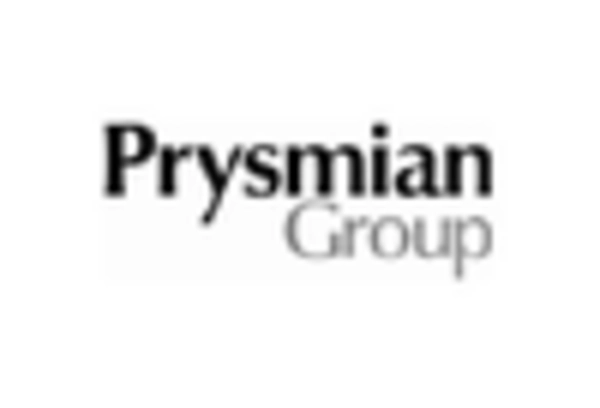Expansion of Interconnected Power Grids
The HVDC Cable Market is significantly influenced by the expansion of interconnected power grids. As countries strive for energy independence and reliability, the need for robust interconnections between regions becomes paramount. HVDC technology enables the efficient transfer of electricity over vast distances, making it an attractive solution for linking renewable energy sources to urban centers. Recent data indicates that the length of HVDC transmission lines is expected to increase by over 30% in the next five years, driven by projects aimed at enhancing grid interconnectivity. This trend not only supports the integration of renewable energy but also bolsters energy security. Consequently, the expansion of interconnected power grids is a pivotal factor propelling the growth of the HVDC Cable Market.
Government Policies Supporting Renewable Energy
The HVDC Cable Market is positively impacted by government policies that promote renewable energy adoption. Many countries are implementing regulations and incentives aimed at increasing the share of renewables in their energy mix. For example, policies that mandate renewable energy targets often necessitate the development of HVDC infrastructure to facilitate the integration of these energy sources. As a result, the market for HVDC cables is expected to grow in tandem with the expansion of renewable energy projects. Recent reports indicate that investments in HVDC technology could reach USD 15 billion by 2025, driven by supportive government initiatives. This alignment of policy and market demand underscores the critical role of government actions in shaping the future of the HVDC Cable Market.
Rising Investment in Infrastructure Development
The HVDC Cable Market is experiencing a surge in investment driven by the need for modernizing aging infrastructure. Governments and private entities are allocating substantial funds to enhance energy transmission capabilities. For instance, investments in HVDC technology are projected to reach approximately USD 20 billion by 2026, reflecting a compound annual growth rate of around 8%. This influx of capital is likely to facilitate the deployment of HVDC systems, which are essential for efficient long-distance power transmission. Furthermore, the integration of HVDC technology into new infrastructure projects is becoming a priority, as it offers advantages such as reduced transmission losses and improved grid stability. As a result, the HVDC Cable Market is poised for growth, with infrastructure development serving as a key driver.
Technological Innovations in Cable Manufacturing
The HVDC Cable Market is benefiting from technological innovations in cable manufacturing processes. Advances in materials science and engineering are leading to the development of cables that are not only more efficient but also more durable. Innovations such as improved insulation materials and enhanced conductor designs are enabling higher voltage ratings and better performance under challenging conditions. Recent advancements suggest that new manufacturing techniques could reduce production costs by up to 20%, making HVDC solutions more accessible. As manufacturers continue to innovate, the market is likely to see an increase in the adoption of HVDC technology across various applications. Therefore, technological innovations in cable manufacturing are a crucial driver of growth within the HVDC Cable Market.
Increasing Demand for Efficient Power Transmission
The HVDC Cable Market is witnessing a growing demand for efficient power transmission solutions. As energy consumption continues to rise, traditional AC transmission systems face limitations in terms of capacity and efficiency. HVDC technology offers a viable alternative, allowing for higher transmission capacities with lower losses. Recent studies suggest that HVDC systems can reduce transmission losses by up to 30% compared to conventional AC systems. This efficiency is particularly crucial in regions with high energy demand and limited generation capacity. Moreover, the shift towards renewable energy sources necessitates the development of efficient transmission networks to connect remote generation sites to consumption centers. Thus, the increasing demand for efficient power transmission is a significant driver of the HVDC Cable Market.

















